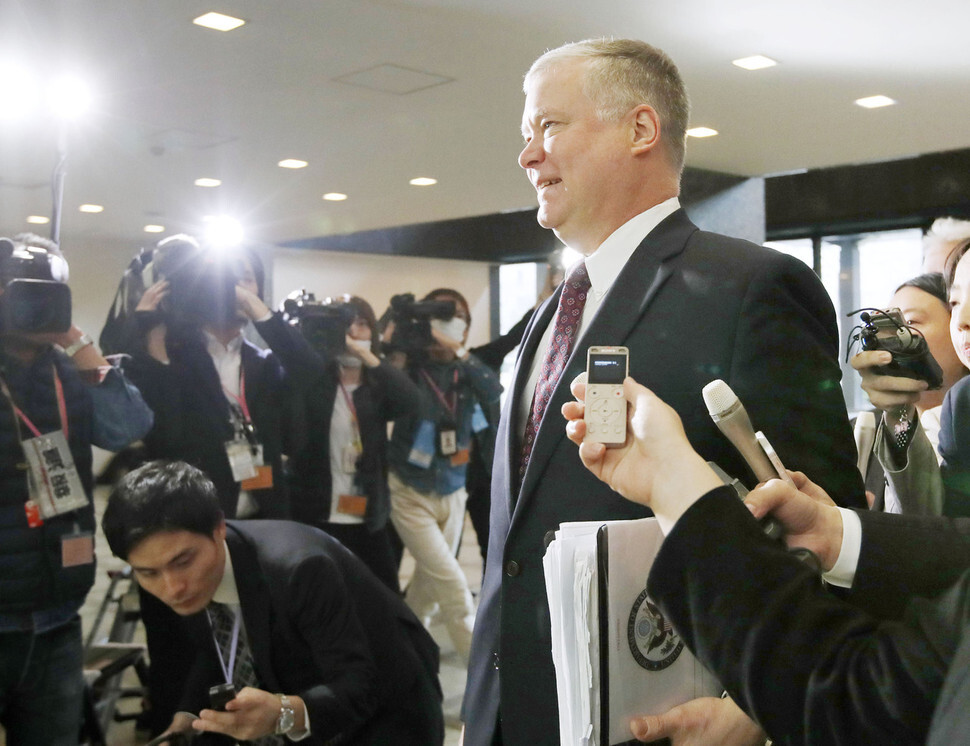Posted on : Dec.19,2019 17:55 KST
 |
|
US Special Representative for North Korea Stephen Biegun talks to reporters after arriving in Tokyo on Dec. 18. (Yonhap News)
|
Nominee for US deputy secretary of state to discuss international coordination on N. Korea sanctions
 |
|
US Special Representative for North Korea Stephen Biegun talks to reporters after arriving in Tokyo on Dec. 18. (Yonhap News)
|
Stephen Biegun, the US State Department special representative for North Korea and nominee to become deputy secretary of state, is visiting China on Dec. 19-20. Analysts said the visit was intended to review international coordination on North Korea sanctions while opening up possibilities for communication between Pyongyang and Washington.
In a Dec. 17 press release, the State Department said that Biegun would “meet with PRC officials to discuss the need to maintain international unity on North Korea” during his China trip.
According to the State Department, the primary aim of Biegun’s visit concerns “international unity on North Korea.” That message appeared to be connected with a draft resolution presented to the UN Security Council the day before by China and Russia, which called for the loosening of sanctions against the North, including exemptions for an inter-Korean railway and road cooperation project. In other words, it signals an attempt to forestall China and Russia breaking ranks on international sanctions at a time when tension-raising activities by North Korea are being predicted.
Biegun’s Beijing visit signal for giving Pyongyang more time
With plans for Biegun to meet with North Korean representatives at Panmunjom falling through during his recent South Korea visit, another aim appears to be giving North Korea more time to consider agreeing to dialogue -- signaling that Biegun is willing to wait in Beijing for a signal from Pyongyang on resuming negotiations. Most analysts agreed the likelihood of North Korea sending a message agreeing to this is not high at present.
Biegun’s China visit was not included on the itinerary for his Asia visit as announced by the State Department on Dec. 13, which had him visiting South Korea from Dec. 15 to 17 and Japan from Dec. 17 to 19. Sources said that the visit had actually been scheduled previously but not disclosed.
With North Korea pressuring the US for a “new method of calculation” with talk of a “Christmas gift,” Pacific Air Forces Commander Gen. Charles Brown predicted at a Defense Writers Group breakfast in Washington, DC, that morning that the gift would be “some kind of long-range ballistic missile.”
“It’s just a matter of does it come on Christmas Eve, does it come on Christmas Day, does it come after the New Year?” he was quoted as saying by the Air Force Times and other media.
Brown was also quoted as mentioning other possibilities, suggesting that “the self-imposed moratorium may go away and nothing happens right away.” In April 2018, North Korea declared its own moratorium on nuclear and ICBM testing; Brown’s remarks suggested that North Korean leader Kim Jong-un may declare a resumption of long-range missile testing but not actually proceed with any launches.
Commenting on the response from the US if diplomatic efforts collapse going forward, Brown noted the deployment of US bombers and stealth fighters together with South Korean fighter aircraft near North Korea when it conducted long-range missile launches in 2017.
“We are looking at all of the things we have done in the past,” he said.
By Lee Jung-ae, staff reporter
Please direct comments or questions to [english@hani.co.kr]










